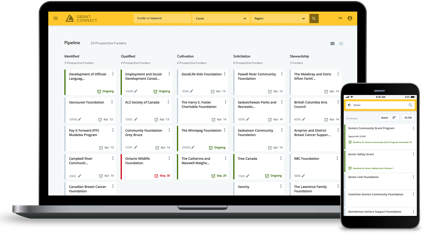With October fast approaching, we sat down with Bill Schaper, Imagine Canada’s director of public policy, about how the upcoming election could affect fundraisers in the nonprofit sector.
Is there anything unique about an election campaign that might have an impact on a charity’s fundraising efforts?
People and the media will be paying more attention to issues than they might at other times – so if your charity has something to say about those issues, there’s an opportunity to raise your profile (with all that it implies). If what you’re saying resonates with people, there’s a chance to attract and form a variety of new relationships. There’s also the possibility that a candidate or party will come out with a position on something that can energize your supporter base. For example, Barrier-Free Canada brought together a number of charities in the lead-up to the 2015 federal election and created a toolkit to help organizations and their supporters advocate for a federal Canadians With Disabilities Act. A commitment to such legislation was then included in the current government’s platform and the new legislation received Royal Assent this year.
On the other hand, charities really need to think through their activities during an election. How contentious – or polarizing – are the issues you’re involved in? Is there a risk that getting too much attention might alienate existing or potential donors?
Something else to keep in mind: Political parties are relying less and less on volunteers and events, and more and more on phone banks and other solutions to do their own fundraising, identify likely voters, and get the vote out. If people are too inundated, they might just tune out completely.
So while there are opportunities during an election, there are also risks. Individual charities – their boards, fundraisers, staff, and volunteers – are going to know their communities the best and what works for one might not work for another.
Can you think of any political fundraising strategies that nonprofit fundraisers could adopt?
We see a lot of political fundraising happening in real time. That is, a politician will say something controversial and within a couple of hours, other parties have crafted and sent out fundraising appeals taking advantage of that. And quite often, they’re not asking for large donations, but encouraging people to give $5 or $10 at a time.
While charities can’t engage in the same kind of rhetoric that politicians can, keeping a sharp eye out for what’s happening in the campaign – both locally and nationally – might result in issue-based messaging you can use.
What social issues have been and will be the most prevalent in this election (education, healthcare, environment, etc.)?
We’ve already seen political parties essentially hanging their hats on issues like climate change, pharmacare, immigration, and making life more affordable for more people. That being said, two parties have put out its full platform yet and real-world events can have a major disruptive effect on the best-laid political strategies. (Think back to 2015 and the issue of Syrian refugees.)
Should nonprofits be worried about ruling out certain donors by making political statements, or should they be encouraged to speak out politically to garner new donations from like-minded people and more donations from current donors?
As I said earlier, there really isn’t a hard and fast rule. In deciding when and if to speak up, charities and nonprofits need to take various considerations into account – not just the reaction of actual and potential donors, but the reaction of the people and communities they serve and the full array of partners they work with. Organizations and their boards are the best placed to weigh all of the potential opportunities and risks.
Should nonprofits be worried about ruling out certain donors by making political statements, or should they be encouraged to speak out politically to garner new donations from like-minded people and more donations from current donors?
As I said earlier, there really isn’t a hard and fast rule. In deciding when and if to speak up, charities and nonprofits need to take various considerations into account – not just the reaction of actual and potential donors, but the reaction of the people and communities they serve and the full array of partners they work with. Organizations and their boards are the best placed to weigh all of the potential opportunities and risks.
What are some policies being proposed by the candidates that could shake up the nonprofit sector?
In terms of the sector as a whole, we’ve not really heard anything from any of the parties yet. We’ll be pushing them to share their visions for the sector. We’ll also be working to highlight the work being done by charities and nonprofits to advance their specific missions and sharing information about the party platforms as they become available.
Check out the HUB and subscribe to the EA - Election series to get your latest policy updates



